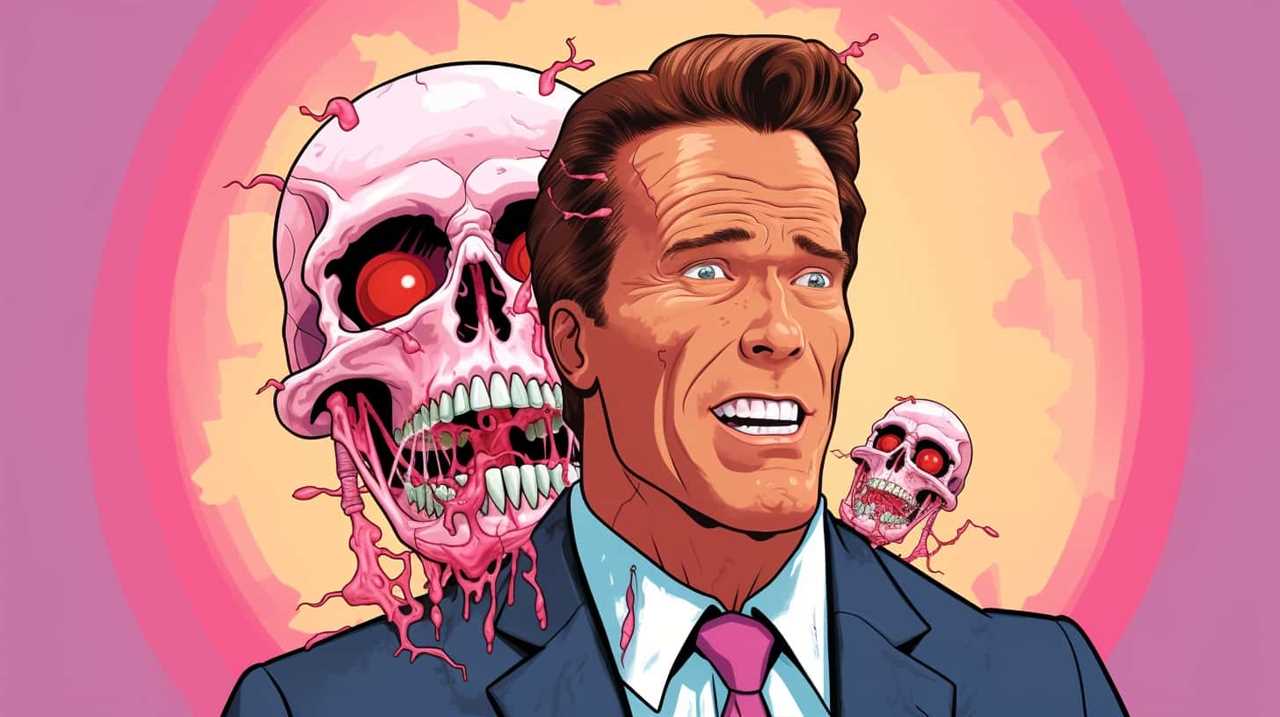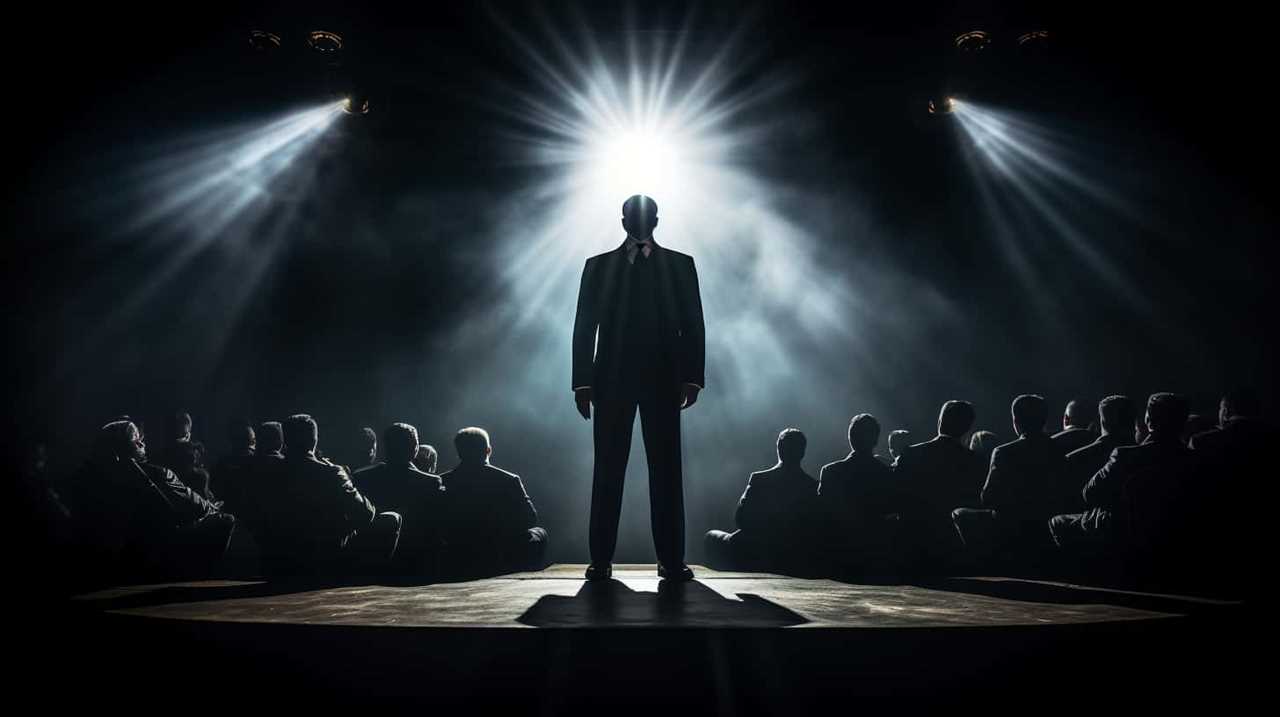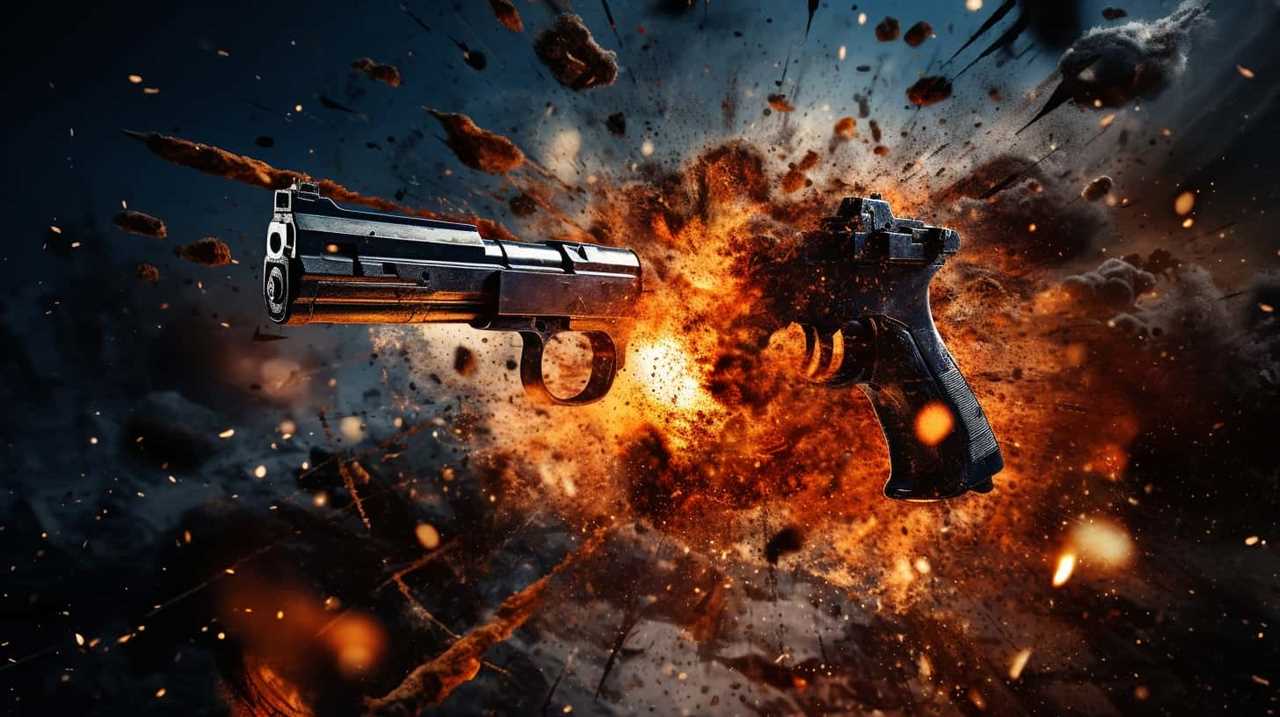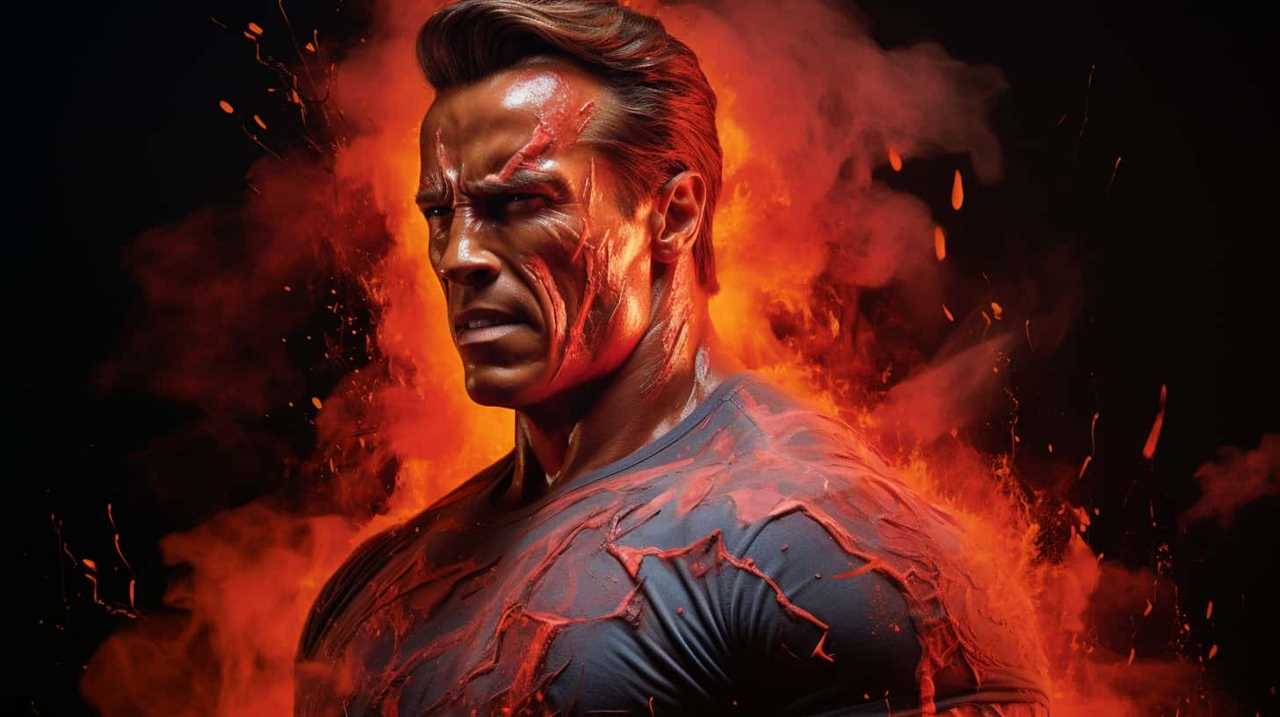In the world of movies, villains have always had an intriguing allure, their words filled with intrigue and evil. They embody our deepest fears and desires, their dialogues making a lasting impact on our collective psyche.
Today, I am thrilled to unveil 14 iconic film villain monologues that will leave you spellbound and craving for more. From the haunting words of The Joker to the menacing speeches of Darth Vader, these soliloquies will ignite your imagination and challenge your perception of evil.
Step into a realm of innovation as we delve into the chilling words of Hannibal Lecter, the sinister soliloquy of the Wicked Witch, and the disturbed monologue of Norman Bates. Brace yourself, for these villainous dialogues will leave an indelible mark on your soul.
Key Takeaways
- Villain monologues have a significant impact and legacy, inspiring discussions, challenging perceptions, and showcasing the power of storytelling.
- The Wicked Witch’s soliloquy represents the relentless pursuit of power, anger towards opposition, and highlights her wicked nature through dark imagery and metaphors.
- Psychological manipulation techniques, such as gaslighting and guilt-tripping, are used by villains to control and dominate others, forcing the audience to question their own susceptibility.
- Villains like Nurse Ratched captivate and terrify the audience through subtle manipulation, emphasizing power dynamics and prompting reflection on the consequences of unchecked authority.
The Joker’s Haunting Monologue
In my opinion, the most haunting monologue delivered by The Joker can be found in the film ‘The Dark Knight’, when he utters his infamous line, ‘Why so serious?’ The Joker’s monologue in this scene is a masterclass in psychological manipulation, leaving a lasting impact on the audience.

The brilliance of this monologue lies in its ability to delve deep into the human psyche and expose our darkest fears and vulnerabilities. The Joker’s choice of words, delivered with an eerie calmness, sends shivers down our spines. The line ‘Why so serious?’ isn’t just a question, but a provocation, challenging us to confront our own seriousness and the absurdity of our existence. It forces us to question the very foundations of our beliefs and the thin line that separates sanity from madness.
Through this monologue, The Joker establishes himself as a chaotic force that thrives on chaos and unpredictability. His manipulation of the audience’s emotions creates a sense of unease and uncertainty, making us question our own moral compass. We become captivated by his twisted logic, feeling both repulsed and drawn to his madness.
The impact of The Joker’s monologue extends beyond the confines of the film. It has become an iconic moment in cinematic history, inspiring countless discussions and analyses. It challenges us to think differently, to embrace innovation and creativity, and to question the very nature of villainy and heroism. The Joker’s monologue is a testament to the power of storytelling and its ability to shape our perception of reality.
Darth Vader’s Menacing Speech
Continuing from The Joker’s haunting monologue, Darth Vader’s menacing speech in the Star Wars franchise solidifies his status as one of the most iconic film villains. With his deep, booming voice and commanding presence, Vader’s dramatic delivery captivates audiences and leaves a lasting impression. Here are four reasons why his speeches are so memorable:

- The Power of the Dark Side: Vader’s speeches often focus on the allure and destructive force of the dark side of the Force. His words convey a sense of danger and power, drawing viewers into his world of darkness and corruption.
- Iconic Catchphrases: From ‘I am your father’ to ‘I find your lack of faith disturbing,’ Vader’s iconic catchphrases have become ingrained in popular culture. These memorable lines add to his intimidating presence and serve as a constant reminder of his villainous nature.
- The Tragic Backstory: In addition to his menacing demeanor, Vader’s speeches also reveal his tragic past as Anakin Skywalker. This adds depth and complexity to his character, making him more than just a one-dimensional villain.
- Symbol of Oppression: Vader’s speeches often touch on the themes of control and oppression, reflecting his role as the enforcer of the Galactic Empire. Through his words, he reinforces the idea of a tyrannical regime and the struggle against it.
Darth Vader’s menacing speeches are a testament to his enduring legacy as one of the greatest film villains of all time. His dramatic delivery and iconic catchphrases continue to captivate audiences, solidifying his place in cinematic history.
Hannibal Lecter’s Chilling Words
Diving into the realm of chilling monologues, let’s now delve into Hannibal Lecter’s haunting words. Hannibal Lecter, the notorious fictional character created by Thomas Harris, has become synonymous with psychological manipulation and terror. His psychological tactics are what make his words so chilling and unforgettable.
Hannibal Lecter’s ability to get inside the minds of his victims and prey on their vulnerabilities is truly disturbing. He uses his intelligence and knowledge of human psychology to exploit their fears and insecurities, leaving them completely defenseless. Through his chilling monologues, Lecter showcases his mastery of manipulation, making him one of the most terrifying villains in film history.
The influence of Hannibal Lecter on pop culture cannot be understated. His character has not only inspired countless adaptations and spin-offs but has also become a cultural icon. People are intrigued by his dark charisma and his ability to toy with the minds of others. Hannibal Lecter has left an indelible mark on our collective consciousness, forever changing the way we view villains in film.

| Psychological Tactics | Influence on Pop Culture | Connection to Real-Life |
|---|---|---|
| Manipulation | Cultural icon | Understanding evil |
| Exploitation | Adaptations | Psychology |
| Intelligence | Dark charisma | Human behavior |
| Vulnerabilities | Film history | Criminal profiling |
| Fear and Insecurity | Intrigue | Forensic psychology |
Hannibal Lecter’s chilling words will continue to haunt audiences for years to come, reminding us of the power of psychological manipulation and the depths of human depravity.
The Wicked Witch’s Sinister Soliloquy
Hannibal Lecter’s chilling monologues may be etched in our memories, but now let’s turn our attention to the sinister soliloquy of the Wicked Witch. While her screen time may be limited, her words pack a haunting punch that leaves a lasting impression. Here’s a closer look at the motivations and symbolism behind her wicked soliloquy:
- Unleashing her fury: The Wicked Witch’s motivation stems from her relentless pursuit of power and control over the magical land of Oz. Her soliloquy serves as a vehicle to express her anger and frustration towards those who dare to stand in her way.
- Symbolism in her words: The Wicked Witch’s soliloquy is filled with dark imagery and metaphorical language. From her references to fire and darkness to her proclamation of vengeance, every word is carefully chosen to convey her sinister intentions and highlight her wicked nature.
- The embodiment of evil: Through her soliloquy, the Wicked Witch establishes herself as the ultimate villain. Her words ooze with malevolence, leaving no doubt that she’s a force to be reckoned with in the land of Oz.
- A lasting impact: The Wicked Witch’s sinister soliloquy not only adds depth to her character but also leaves a lasting impact on the audience. It serves as a reminder of the power of words and the chilling effect they can have when delivered with conviction.
As we delve into the disturbed monologue of Norman Bates, let’s explore how his words unravel the depths of his twisted psyche.
Norman Bates’ Disturbed Monologue
Exploring Norman Bates’ unsettling soliloquy delves into the depths of his disturbed psyche. In Alfred Hitchcock’s classic film ‘Psycho,’ Bates delivers a monologue that reveals his inner turmoil and offers a glimpse into his complex character. The audience is confronted with the exploration of dissociative identity disorder, a mental condition in which an individual possesses two or more distinct identities or personality states.
Bates’ monologue showcases his struggle with this disorder, as he switches between his own voice and that of his deceased mother. The monologue is a chilling portrayal of Bates’ internal conflict. He confesses to his crimes while simultaneously denying any responsibility for them, blaming his actions on his mother’s influence. The words he speaks are a manifestation of his fractured psyche, highlighting the immense struggle he faces in reconciling his own identity with the dominant presence of his mother.
This monologue captivates the audience by showcasing the complexity of Bates’ character. It forces us to question the nature of evil and the extent to which our own identities are shaped by external influences. Bates’ inner turmoil becomes a metaphor for the internal battles we all face, as we grapple with our own desires, fears, and societal expectations.
Voldemort’s Vengeful Rant
During Voldemort’s vengeful rant, I’m confronted with the malevolent intensity that emanates from the darkest depths of his soul. His voice, dripping with venom, resonates in the air, sending shivers down my spine. As I listen, I can’t help but be captivated by the sheer force of his twisted words. Here, I delve into Voldemort’s hidden agenda, exploring the parallels between his malevolence and The Joker’s twisted ideology.
- The quest for immortality: Voldemort’s obsession with immortality mirrors The Joker’s desire for chaos. Both villains seek power and control, believing that their ideologies will grant them eternal dominance.
- Manipulation and deception: Voldemort’s ability to manipulate others mirrors The Joker’s knack for playing mind games. They both thrive on exploiting the weaknesses of those around them, reveling in the chaos they create.
- The pursuit of fear: Voldemort and The Joker both derive pleasure from instilling fear in others. They understand that fear breeds chaos and allows them to maintain control over their adversaries.
- The destruction of hope: Both villains aim to crush hope and optimism, leaving a world devoid of light. They revel in the despair they create, feeding off the darkness that permeates their surroundings.
Through Voldemort’s vengeful rant, I witness the embodiment of evil, as he unveils his hidden agenda and reveals the depths of his wickedness. The parallels between his malevolence and The Joker’s twisted ideology serve as a chilling reminder of the power that villains hold over our collective imagination.

Hans Landa’s Intimidating Dialogue
In my encounter with Hans Landa’s intimidating dialogue, I’m confronted by the sheer force of his words, which leave me feeling unnerved and powerless. Landa, portrayed brilliantly by Christoph Waltz in Quentin Tarantino’s ‘Inglourious Basterds,’ possesses a commanding presence that exudes both intelligence and menace. His ability to deliver a powerful monologue is a masterclass in the art of intimidation.
Landa’s intimidating presence is enhanced by his impeccable diction and unwavering eye contact. He uses his words as weapons, carefully selecting each one for maximum impact. His monologues aren’t mere ramblings; they’re calculated and purposeful, designed to instill fear and assert his dominance. Landa’s dialogue is filled with subtle nuances and hidden threats, forcing the listener to hang on his every word.
What sets Landa apart is his ability to manipulate the emotions of those around him. He effortlessly switches between charming and terrifying, making it nearly impossible to predict his next move. His monologues aren’t just meant to convey information; they’re a psychological assault, designed to break down his opponents mentally and emotionally.
In the realm of film villains, Hans Landa’s intimidating dialogue stands out as a testament to the power of words. It showcases the art of delivering a powerful monologue, captivating audiences and leaving them in awe of his sheer presence.

Nurse Ratched’s Manipulative Monologue
One memorable moment in ‘Iconic Film Villain Monologues Unveiled’ is Nurse Ratched’s manipulative monologue. This powerful scene showcases the psychological manipulation techniques employed by the character, leaving a lasting impact on the audience.
Here are four reasons why this monologue is so effective:
- Subtle manipulation: Nurse Ratched’s monologue is a masterclass in subtle manipulation. She carefully crafts her words, using tone and body language to assert control over her patients. This calculated approach draws the audience in, making them feel uneasy and uncertain.
- Emotional manipulation: Through her monologue, Nurse Ratched exploits the vulnerabilities of her patients, manipulating their emotions to maintain her power. She plays on their fears, insecurities, and desires, evoking a strong reaction from the audience who empathize with the characters’ plight.
- Power dynamics: The monologue highlights the power dynamics at play within the film. Nurse Ratched uses her position of authority to exert control over her patients, emphasizing the power imbalance and further intensifying the audience’s reaction.
- Lack of empathy: Nurse Ratched’s lack of empathy is evident throughout the monologue. Her cold and calculated demeanor leaves the audience feeling disturbed and challenged, forcing them to question the limits of human compassion.
Anton Chigurh’s Unsettling Conversation
As I reflect on Anton Chigurh’s unsettling conversation in the film, I’m struck by his chilling presence and the impact of his words.
Chigurh’s calm demeanor and piercing stare create an atmosphere of unease, making it impossible to look away.

His dialogue, filled with philosophical musings and brutal threats, leaves a lasting impression, forcing us to confront the darkness within human nature.
Chigurh’s Chilling Presence
I was immediately captivated by Anton Chigurh’s unsettling conversation, as his chilling presence filled the screen. Here are four reasons why Chigurh’s enigmatic nature and the significance of his coin toss make his character so compelling:
- Mystery: Chigurh’s enigmatic nature leaves viewers guessing about his intentions and motivations. His cryptic dialogue and unpredictable actions keep us on the edge of our seats, never knowing what he’ll do next.
- Psychological tension: The coin toss becomes a symbol of Chigurh’s twisted moral code. By leaving life and death to chance, he creates an unnerving sense of uncertainty and dread. It forces us to question our own beliefs about fate and free will.
- Unforgettable presence: Chigurh’s calm and collected demeanor, combined with his ruthless violence, make him an unforgettable presence on screen. His cold, calculating gaze and monotone voice create an atmosphere of unease that lingers long after the film ends.
- Symbolic depth: Chigurh’s character represents the embodiment of evil and the chaotic forces of the universe. His relentless pursuit and complete disregard for human life serve as a reminder of the darkness that exists in the world, challenging our notions of morality and the nature of evil.
Impact of His Words
Discussing the impact of Anton Chigurh’s unsettling conversation, his words leave an indelible mark on the audience. Chigurh, portrayed brilliantly by Javier Bardem in ‘No Country for Old Men,’ speaks with a calm and calculated demeanor that’s both mesmerizing and terrifying. His dialogue is sparse, yet each word carries immense weight, leaving the audience hanging on his every syllable.
The true brilliance of Chigurh’s words lies in their ambiguity, allowing for audience interpretation and emotional resonance. His unsettling conversation forces us to confront our own fears and moral compass, leaving us with a lingering sense of unease long after the film has ended.

Transitioning into the subsequent section about Keyser Söze’s mysterious monologue, we encounter another masterful villain whose words will captivate and perplex us.
Keyser Söze’s Mysterious Monologue
During my analysis of iconic film villain monologues, I found particular intrigue in Keyser Söze’s enigmatic soliloquy. The meaning behind Keyser Söze’s identity and the impact of his monologue on the film’s plot are two key aspects that make his speech truly captivating.
Here are four reasons why Keyser Söze’s mysterious monologue stands out:
- Unveiling the unknown: Keyser Söze’s monologue serves as a revelation, peeling back the layers of mystery surrounding his true identity. Through his words, we’re granted a glimpse into the mind of a cunning and elusive antagonist.
- Psychological warfare: Söze’s monologue isn’t just a means to convey information, but also a tool to manipulate and instill fear. His words are carefully crafted to unsettle his adversaries and establish his dominance.
- Foreshadowing and plot twists: The monologue adds depth to the film’s narrative by foreshadowing events and introducing unexpected plot twists. It keeps the audience on the edge of their seats, questioning everything they thought they knew.
- Leaving lasting impressions: Keyser Söze’s monologue is hauntingly memorable. It lingers in our minds long after the movie ends, leaving us with a sense of awe and fascination.
As we delve further into the world of iconic film villain monologues, it’s now time to shift our focus to Colonel Hans Landa’s cunning speech and its impact on the plot.

Colonel Hans Landa’s Cunning Speech
Continuing our exploration of iconic film villain monologues, let’s now delve into Colonel Hans Landa’s cunning speech and its impact on the plot.
In Quentin Tarantino’s masterpiece ‘Inglourious Basterds,’ Colonel Hans Landa, portrayed brilliantly by Christoph Waltz, delivers a monologue that showcases his exceptional linguistic skills and leaves a lasting impact on the audience’s emotions.
Landa’s speech is a masterclass in manipulation. He effortlessly switches between languages, using his fluency in German, French, and English to disarm and control those around him. This linguistic prowess serves as a metaphor for his cunning intelligence, elevating him to a level of villainy rarely seen on screen. As Landa weaves his words, the audience becomes entranced, hanging on his every syllable.
The impact on the audience’s emotions is profound. Landa’s calm demeanor and eloquent speech create a sense of unease and tension. We’re simultaneously repulsed by his villainous actions and captivated by his charisma. This emotional rollercoaster leaves the audience questioning their own reactions, blurring the lines between sympathy and repulsion.

Transitioning into the subsequent section about Nurse Ratched’s cruel soliloquy, we shift from Landa’s calculated manipulation to Ratched’s chilling cruelty. Both monologues showcase the power of words, but in vastly different ways.
Nurse Ratched’s Cruel Soliloquy
Nurse Ratched’s cruel soliloquy leaves a lasting impact on viewers, showcasing the power of her words to manipulate and control. Through her psychological manipulation techniques, she exerts her authority and bends others to her will.
As an audience, we’re torn between feeling repulsed by her cruelty and yet strangely drawn to her commanding presence, creating a complex mix of emotions that challenge our empathy.
Impact of Ratched’s Words
How did Ratched’s words profoundly affect me?

The manipulative tactics employed by Nurse Ratched in her cruel soliloquy left me feeling unsettled and disturbed. Her words were carefully crafted to evoke fear and submission, highlighting her mastery of emotional manipulation.
The impact of her words was profound, as they revealed the depths of her power and control over the patients in the mental institution.
Ratched’s calculated use of language and tone conveyed a chilling sense of authority, instilling a sense of helplessness in both the characters on screen and the audience watching.
This portrayal of psychological manipulation not only captivated my attention, but also served as a stark reminder of the dangers of unchecked authority and the lasting effects of emotional manipulation.

Psychological Manipulation Techniques
Feeling the impact of Ratched’s manipulative tactics, her cruel soliloquy further reveals the psychological manipulation techniques employed by this iconic film villain. Ratched’s ability to control and dominate her patients through psychological manipulation is a testament to her power as a character.
Through her words, she instills fear, doubt, and insecurity, effectively breaking down her patients’ sense of self and autonomy. By using techniques such as gaslighting, emotional manipulation, and guilt-tripping, Ratched creates a toxic environment where her patients are trapped and vulnerable.
These techniques not only affect the characters within the film but also have a profound impact on the audience’s perspective. We’re forced to question our own susceptibility to manipulation and confront the darker aspects of human nature.
Ratched’s soliloquy serves as a stark reminder of the lasting effects of psychological manipulation and its ability to shape our perceptions.

Audience Reaction and Empathy
Experiencing the impact of Ratched’s manipulative tactics, I couldn’t help but empathize with the vulnerable characters as her cruel soliloquy unfolded. The audience interpretation of Nurse Ratched’s character is crucial in understanding the portrayal of villains in film. Here are four reasons why her monologue evoked such a strong reaction:
- Subtle manipulation: Ratched’s ability to subtly manipulate those around her is both captivating and terrifying. It forces the audience to question their own susceptibility to manipulation.
- Power dynamics: The power dynamics between Ratched and her patients highlight the vulnerability of the mentally ill. This portrayal elicits empathy and raises awareness about the importance of compassionate healthcare.
- Emotional manipulation: Ratched’s soliloquy is filled with emotional manipulation, making the audience feel a range of emotions from anger to sadness. This emotional rollercoaster keeps the audience engaged and invested in the story.
- Real-world parallels: Ratched’s character reminds us of real-life figures who abuse their power and exploit the vulnerable. This connection to reality makes her actions even more disturbing and prompts reflection on the consequences of unchecked authority.
The Evil Queen’s Envious Monologue
Why does the Evil Queen’s envious monologue captivate audiences with its intense portrayal of jealousy?
The Evil Queen’s envy is a powerful emotion that resonates with viewers on a deep level. Her monologue not only showcases her envy towards Snow White’s beauty and youth, but also reveals the underlying insecurities and fears that fuel her obsession. This intense portrayal of jealousy allows audiences to not only understand the Evil Queen’s motivations, but also to empathize with her on some level.
The impact on viewers is profound. By delving into the Evil Queen’s psyche, the monologue highlights the destructive nature of envy and the consequences it can have on both ourselves and those around us. It serves as a cautionary tale, reminding us of the dangers of allowing envy to consume us. This introspective look into the mind of a villain challenges our preconceived notions and forces us to confront our own feelings of envy and jealousy.

Moreover, the monologue showcases the Evil Queen’s complex character, adding depth and dimension to her role as a villain. It humanizes her, making her more relatable and multidimensional. This innovative approach to portraying a villain not only captivates audiences, but also pushes the boundaries of storytelling, encouraging us to see villains in a new light.
Amon Goeth’s Sadistic Dialogue
As I reflect on Amon Goeth’s sadistic dialogue in the film, I’m struck by the power of his words. The psychological impact on viewers is palpable, as Goeth’s cruel and brutal speeches leave us feeling disturbed and unsettled.
Through his dialogue, we witness the chilling depths of his character, as his words reveal his sadistic nature and lack of empathy.
Power of Words
In the article, I’ll explore the chilling power of Amon Goeth’s sadistic dialogue as portrayed in the iconic film. Here are four reasons why his words have such a profound impact on viewers:

- Power of Persuasion: Goeth’s ability to manipulate others through his words is truly terrifying. He uses his eloquence to convince his subordinates and even his victims to carry out his sadistic desires.
- Emotional Manipulation: Through his dialogue, Goeth taps into the deepest fears and insecurities of those around him. He knows how to exploit their vulnerabilities and control them emotionally.
- Disturbing Realism: The dialogue in the film is so well-written and delivered that it feels uncomfortably real. It makes us question the depths of human depravity and the power of words to perpetuate evil.
- Haunting Impact: Long after the film is over, Goeth’s words linger in our minds, haunting us. They force us to confront the darkness within ourselves and the potential for cruelty that exists in humanity.
Goeth’s sadistic dialogue leaves a lasting psychological impact on viewers, reminding us of the terrifying power of words to persuade, manipulate, and inflict pain.
Psychological Impact on Viewers
From my perspective, the chilling power of Amon Goeth’s sadistic dialogue in the iconic film is undeniable due to the psychological impact it has on viewers. Goeth’s words and actions create a sense of fear, unease, and discomfort that lingers long after the film has ended.
The audience interpretation of Goeth’s sadistic dialogue is crucial in understanding the emotional connection it establishes. His cruel and dehumanizing words not only showcase his own malevolence but also force viewers to confront the darkest aspects of human nature. This psychological impact forces us to question our own capacity for cruelty and the potential for evil within ourselves.
As we delve deeper into the character development through dialogue, Goeth’s sadistic monologues provide a chilling insight into the depths of his depravity, further emphasizing the impact of his words on the audience.

Character Development Through Dialogue
The impact of Amon Goeth’s sadistic dialogue on viewers is evident in the chilling character development it portrays. Through his words, we witness the transformation of a seemingly ordinary man into a ruthless and cruel villain. Here are four storytelling techniques that contribute to this character development:
- Eloquent Manipulation: Goeth’s ability to manipulate and exploit others through his words showcases his cunning nature and his desire for power and control.
- Dehumanizing Language: The use of dehumanizing language by Goeth towards his victims highlights his complete lack of empathy and his belief in the superiority of his own race.
- Sadistic Pleasure: Goeth’s sadistic enjoyment of inflicting pain is evident in his dialogue, revealing his twisted mindset and the depths of his depravity.
- Inner Conflicts: Despite his monstrous behavior, Goeth occasionally reveals glimpses of remorse or vulnerability, providing a complex and conflicted portrayal of a character driven by his own demons.
Through these storytelling techniques, Amon Goeth’s sadistic dialogue not only horrifies viewers but also provides a deeper understanding of his character and the darkness that resides within him.
Frequently Asked Questions
How Did the Actor Prepare for Their Iconic Villainous Monologue?
To prepare for my iconic villainous monologue, I delved deep into the psyche of my character, exploring their twisted motivations and dark desires. Through an intense rehearsal process, I honed every word and gesture to create a truly captivating performance.
What Impact Did the Villain’s Monologue Have on the Audience?
The impact of a villain’s monologue on the audience is profound. It creates an emotional connection, tapping into our darkest fears and desires. Through their words, villains challenge our beliefs and make us question our own morality.

Were There Any Specific Techniques or Strategies Used by the Actor to Make the Monologue More Chilling or Menacing?
In those chilling moments, the actor’s techniques transform mere words into a symphony of menace. Through subtle nuances in delivery and captivating stage presence, they weave a tapestry of fear that lingers long after the monologue ends.
Did the Director Have Any Input or Specific Vision for the Delivery of the Monologue?
The director’s input and the actor’s interpretation play crucial roles in delivering a chilling and menacing monologue. Their collaboration helps bring the director’s vision to life and allows the actor to showcase their skills and creativity.
How Does the Villain’s Monologue Contribute to the Overall Narrative or Theme of the Film?
The villain’s monologue adds symbolic significance to the film, weaving a deeper narrative thread. Through their words, we gain insight into their motivations, fears, and twisted logic, contributing to their character development and the overall theme of the story. As the adage goes, "Actions speak louder than words, but words reveal the true nature within."
Are These 7 Iconic Film Villain Monologues Included in the 14 Iconic Film Villain Monologues?
Yes, these 7 iconic film villain monologues are indeed included in the collection of 14 iconic film villain monologues. Each monologue showcases the powerful and unforgettable performances of some of the most legendary villains in film history. These monologues continue to captivate and chill audiences to this day.
Conclusion
In a world where darkness and evil reign supreme, these iconic film villain monologues serve as haunting reminders of the depths of human depravity.

From the Joker’s twisted sense of humor to Darth Vader’s menacing presence, each villain’s words penetrate the soul with their chilling allure.
Through euphemistic language, these monologues captivate audiences, leaving them both disturbed and enthralled.
As we delve into the minds of these villains, we’re forced to confront the darker aspects of our own humanity, sparking a morbid fascination that lingers long after the credits roll.









